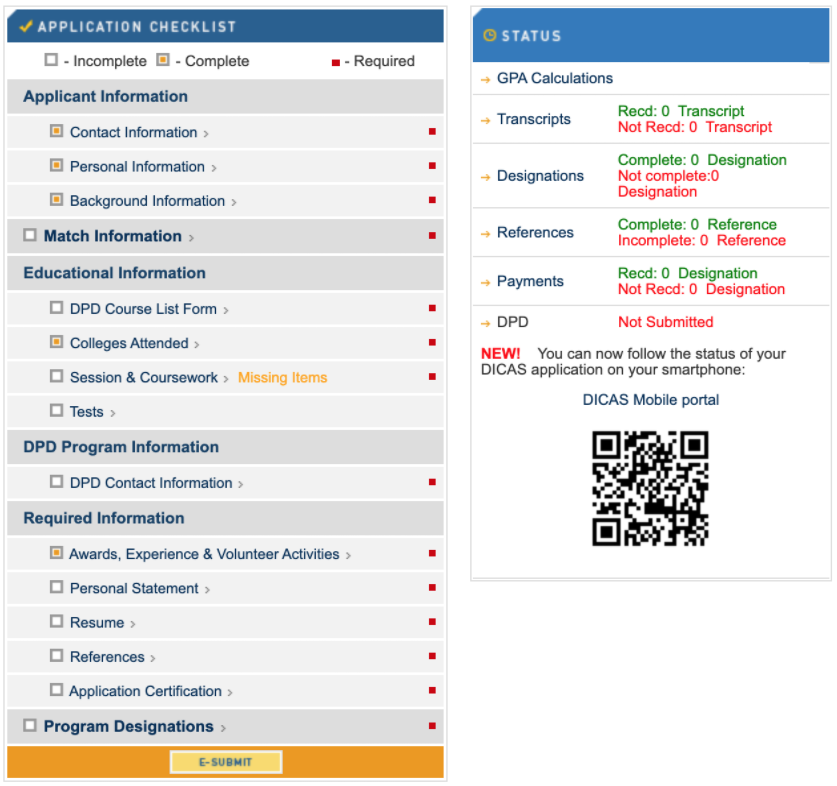Getting Matched to a Dietetic Internship
Written by Lucia Botta, Emahlea Jackson, NDTR, Jeniffer Peeples, Ebony White
This guide was written by students and dietetic interns. Although this is by no means a comprehensive guide for dietetic internship matching, we intend for this post to serve as a resource with some tips and tricks that you may not have heard before. We will walk you through several topics, from gaining experience to put on your resume, all the way to nailing your interviews.
Gaining experience and learning time management skills
While earning my Bachelors degree, I did not have enough time for a job, due to a long commute and other adult responsibilities. If you are in a similar situation, do not fear, there are ways to gain other experiences that take up less time and can land you an internship. Internships are looking for students to have leadership experience and like to see students involved in dietetic organizations. You can gain this experience by obtaining a leadership position with your school’s food and nutrition club, finding a role with your local dietetic association (like GSDA!), or with the Academy of Nutrition and Dietetics.
Finding nutrition related volunteer opportunities will also be key to adding to your experiences; you can find many opportunities by connecting with groups on social media where RD’s search for virtual assistance. It’s also important to note that some internships will rank work experience relatively high, so you might need to secure a more flexible part time job. Even a few hours a week can suffice and help you get matched with those internships. I found that if I was pressed for time with school, the one thing that helped was for me to study my material on my drives by talking it out. Try not to overextend yourself! Earn good grades and do what you can with the extra time you do have.
Working with the challenges of being a parent, non-traditional student, and/or second career student while pursuing dietetics education
Being a non-traditional student who is embarking on a second career can be tough especially when your first career had little to do with the second. On top of that, having to take care of a family and all of the sudden meeting the expectations and qualifications of the internship you want to be matched with may seem like a daunting task. You do not need to feel this way. Chances are that you’ve had a laser focus on ensuring your GPA remains high. Once you reach a particular age and mindset, two things you will not waste are your time and your money. Hit those books and make the grade. GPA, however, is not the only thing that an internship is looking for. They are also looking at your work experience and volunteer experience. These are the two areas you may be lacking in due to obligations from school and home. Do not worry, there is hope!
You may not have the time to go out and work while in school, but you can make previous career experiences work for you. Read the program description, mission, goals and preferred qualifications that the internship is looking for in a candidate. Highlight words and phrases they repeat in all of those sections, as these are qualities that are important to the institution. Now, look at your resume and think back to past experiences that may link to those words/phrases, and speak to them in your personal statement. If you see references to being a leader and have management experience, weave that into your personal statement. If they want someone who has interest in nutrition education, and you used to be a teacher, include that! You may not have been a nutrition educator but being able to hold an audience and teach them a subject is not easy. Already having the capability to teach will make it that much easier to become a nutrition educator in your community. Really just make the work you have done up to this point work for you. You have the experience, just apply it to this field.
The area that may be tricky is volunteer experience. What has worked for me is finding places that will not only allow me to volunteer but will also allow my family to volunteer with me. This may require some research on your part, but it will be worth it on multiple levels. You will gain the volunteer hours you need as well as teaching your family about giving back to the community. There are food banks that will allow children as young as six years old to volunteer along with you. There are organizations that collect food and need people to go pick up the food from donors. You may be able to volunteer for meals-on-wheels type organizations, delivering food to those in need. If none of that works for you, get creative. Create an opportunity for yourself. Reach out to an organization that is helping an underserved or disenfranchised group of people. Ask if their clientele may need assistance with food. Create a food drive that benefits that group of people. In spearheading the operation, you are not only feeding people and families in need, but also showing ingenuity and gaining valuable leadership experience.
If nothing else, be creative! You have experience that is valuable and can be applied to the internship’s requirements; you just need to show them how. Marry these tips with others throughout this post and you are well on your way to being accepted to the internship of your dreams.
Managing the technical side of applications and developing a resume
 One of the more frustrating sides of your dietetic internship application process can be navigating the online matching system of DICAS (and every other application website you may encounter during the matching or applying process). The best advice for becoming accustomed to DICAS is to create an account and begin filling out the application as soon as possible – yes, even if you are in your freshman year of college! No matter how many volunteer hours you rack up or the countless number of days you spend studying from sunrise to sundown, you will still end up spending a non-trivial amount of your time learning about the user interface on DICAS (see above) and assembling your application as part of the match process.
One of the more frustrating sides of your dietetic internship application process can be navigating the online matching system of DICAS (and every other application website you may encounter during the matching or applying process). The best advice for becoming accustomed to DICAS is to create an account and begin filling out the application as soon as possible – yes, even if you are in your freshman year of college! No matter how many volunteer hours you rack up or the countless number of days you spend studying from sunrise to sundown, you will still end up spending a non-trivial amount of your time learning about the user interface on DICAS (see above) and assembling your application as part of the match process.
Additionally, if you are planning to apply to programs that are not through DICAS, consider making an account in advance on the program’s website so that you can become familiar with its interface. Note that there is a possibility that contents may be erased between application cycles from non-DICAS websites, but DICAS appears to permanently maintain all inputted information until you fully submit your application. There will be periods of time where DICAS is not accessible, but as of the 2020/2021 application cycle, this does not indicate that your inputted data have been deleted.
Regardless of your plans for getting your supervised practice experience, though, get started as early as possible with chronicling your volunteer hours, professional experience, grades in dietetics and science courses as a way to set your mind at ease when your matching/application season finally arrives. When you get a new job, add it to both your resume and DICAS (and LinkedIn for good measure). When you finish a quarter or semester at school, input your grades into DICAS if they’re required. If you receive an award or scholarship, be sure to log into DICAS and add that experience. Consider it a second form of your resume or curriculum vitae until you’ve completed the matching process.
You will also need a carefully-crafted resume as you apply to internships, programs, and other professional experiences. If you are planning to enter into academia or are applying to a doctoral or research-based program, you may opt for a curriculum vitae, which is simply a non-abridged version of a resume that often contains professional experience, volunteer experience, guest lectures and professional presentations, departmental/campus involvement, publications, membership to professional societies, certifications, and any other relevant activities that you have completed throughout your career. For a resume, however, you will want to be thoughtful and strategic in how you curate your experiences, as most resumes only span the length of a single page or two.
There are many free templates available online that you can easily use to create an attractive, legible resume. Google Docs has a few resume templates, the free version of Canva has some options, and Microsoft Word also has a nice selection available. Other websites may offer more sophisticated or customizable templates, but be mindful of the risks involved in sharing data with and downloading files from a website with which you may be unfamiliar. A good resume is easy on the eyes (e.g., minimum of 11pt font, serif font for digital distribution, not too many words, adequate white space, etc.), has pertinent information (e.g., name, email, phone number, etc.) in a visible location, and does not burden the reader with extraneous or otherwise irrelevant information (i.e., ask yourself what you think would be important if you were the reviewer before writing it down). Use past-tense verbs for describing experiences that have concluded, and use present-tense verbs for positions you currently hold. Format your dates identically for every experience: if you spell out the word “January,” be sure that you have completely spelled out all other month names. Use bulleted lists for items that have more than one point, or very brief sentences with articles (i.e., “a,” “an,” “the”) removed to describe activities and duties of an experience (e.g., Created blog post for Greater Seattle Dietetics Association).
Crafting your personal statement and preparing for your interviews
Personal Statement
When it comes to writing your personal statement, start EARLY! Know that you’ll likely be writing many different versions and drafts, so plan to write the first draft in October. Most dietetic internship programs have the question prompts listed on their website, answering those first is a great place to start. It may help to answer each question individually and then later put it all together cohesively. Have your resume next to you while writing your personal statement and draw specific examples from the volunteer, leadership, and work experiences you’ve held. Think about how your experiences make you unique, and highlight the specific skills you gained and how these skills will transfer to dietetics and the specific dietetic internship you’re applying to. Refer to the Academy’s resources detailing the scope of practice as a dietitian and pull specific language from these documents to incorporate in your essay. A useful tool to use when structuring your paragraphs and answering the specific prompts is the S.T.A.R. method (Jenny Westercamp from All Access Dietitians has a great video on how to utilize the STAR method here):
- SITUATION: What was the problem or purpose for the needed action? What happened? What was your role?
- TASK: What need did you see? What was the challenge, agenda, intention? What were you trying to accomplish?
- ACTION: What did you do first, next?
- RESULT: What happened? What did you accomplish or learn? What changed, increased, decreased and by how much? How did it make you/ people/ your boss feel?
When you’re ready to put it all together, add in an opening paragraph that displays a solid first impression and will hook the reader. Convey yourself as a unique, qualified, and multi-dimensional future nutrition professional. Lastly, proof-read, proof-read, and proof-read again! Have your classmates, professors, and mentors read your personal statements. Give them deadlines and formally thank them for their support. It’s important to value their edits and advice but also don’t feel as though you need to take it all and change everything. Before you submit make sure it is within the word count limit – this is very important because it shows you’ve read the instructions.
Interview Prep
Being selected for a dietetic internship interview can be both exciting and terrifying at the same time. You’ve worked so hard and put in years of time for this moment and this kind of pressure can be debilitating at times. But remember one thing: if you’ve been selected for an interview, that means that the internship director is highly considering you for the internship. This is your time to show them who you are. You have the knowledge, so be confident and trust that you know what you’re talking about. They’re looking to see if you are a good fit for their particular program, work well under pressure, can be autonomous, and are able to make evidence-based decisions when the supervisor or preceptor may not be around. Don’t be afraid to take your time answering the questions or ask them to repeat the questions. If you’re a visual person and know that your nerves may impact your ability to fully listen and understand the questions being asked, bring a pen and paper to the interview and write down the questions so you can really think deeply about your answer.
Just like the personal statement, start preparing early and set up a mock interview session with some of your classmates and/or mentors. Here is a list of sample dietetic internship interview questions to go over during your mock interview. Lastly, remember that an interview is a two-way street, you should also interview them to make sure this program is the right fit for you and your career development. Think of at least three thoughtful questions ahead of time that you want to ask the interviewers. Make sure you do your research and ask questions that aren’t already on the website, this will show you did your homework.
We know this is a stressful time, but it’s important to relax and make the most of it. Stay present and be grateful for the opportunity to apply to a dietetic internship. You have worked extremely hard and have jumped over many hurdles to get to this point… what’s one more? Becoming a dietitian is just around the corner. Good luck!

